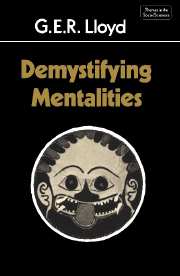Book contents
- Frontmatter
- Contents
- Note on texts and references
- Acknowledgements
- Introduction
- 1 Mentalities, metaphors and the foundations of science
- 2 Magic and science, ancient and modern
- 3 The conception and practice of proof
- 4 A test case: China and Greece, comparisons and contrasts
- Conclusion: mentalities demystified
- Notes
- Bibliography
- Index
Conclusion: mentalities demystified
Published online by Cambridge University Press: 07 January 2010
- Frontmatter
- Contents
- Note on texts and references
- Acknowledgements
- Introduction
- 1 Mentalities, metaphors and the foundations of science
- 2 Magic and science, ancient and modern
- 3 The conception and practice of proof
- 4 A test case: China and Greece, comparisons and contrasts
- Conclusion: mentalities demystified
- Notes
- Bibliography
- Index
Summary
The starting-point of our inquiry was the question of the validity and usefulness of the notion of mentalities and we may now attempt, in conclusion, to reassess that general issue in the light of the findings of our case-studies. As we saw at the outset, the notion of mentalities has been invoked in a variety of contexts, notably in social anthropology, in philosophy, in history and in psychology. The strength of the claims made in connection with the use of this notion has varied considerably. In some writers talk of a mentality seems to amount to little more than talk of certain recurrent attitudes, views or interests. At the same time some other appeals to the notion appear to have very sweeping implications indeed. This is true particularly when it is assumed that a whole culture, or a society at a particular period of time, or again each of a number of stages in universal human cognitive development, exhibits certain distinctive mental characteristics.
Evidently not all uses of mentalities are equivalent, and in particular it is not always clear just how far there is a commitment to those potentially sweeping implications. Again the ramifications of the appeal to mentalities in the methodological debates of historians, or in those of cognitive psychology, stretch well beyond the particular problems we have tackled here – as also do many other related issues to do with meaning and culture that have been aired in debates in linguistics, in philosophy and in social anthropology.
- Type
- Chapter
- Information
- Demystifying Mentalities , pp. 135 - 145Publisher: Cambridge University PressPrint publication year: 1990



